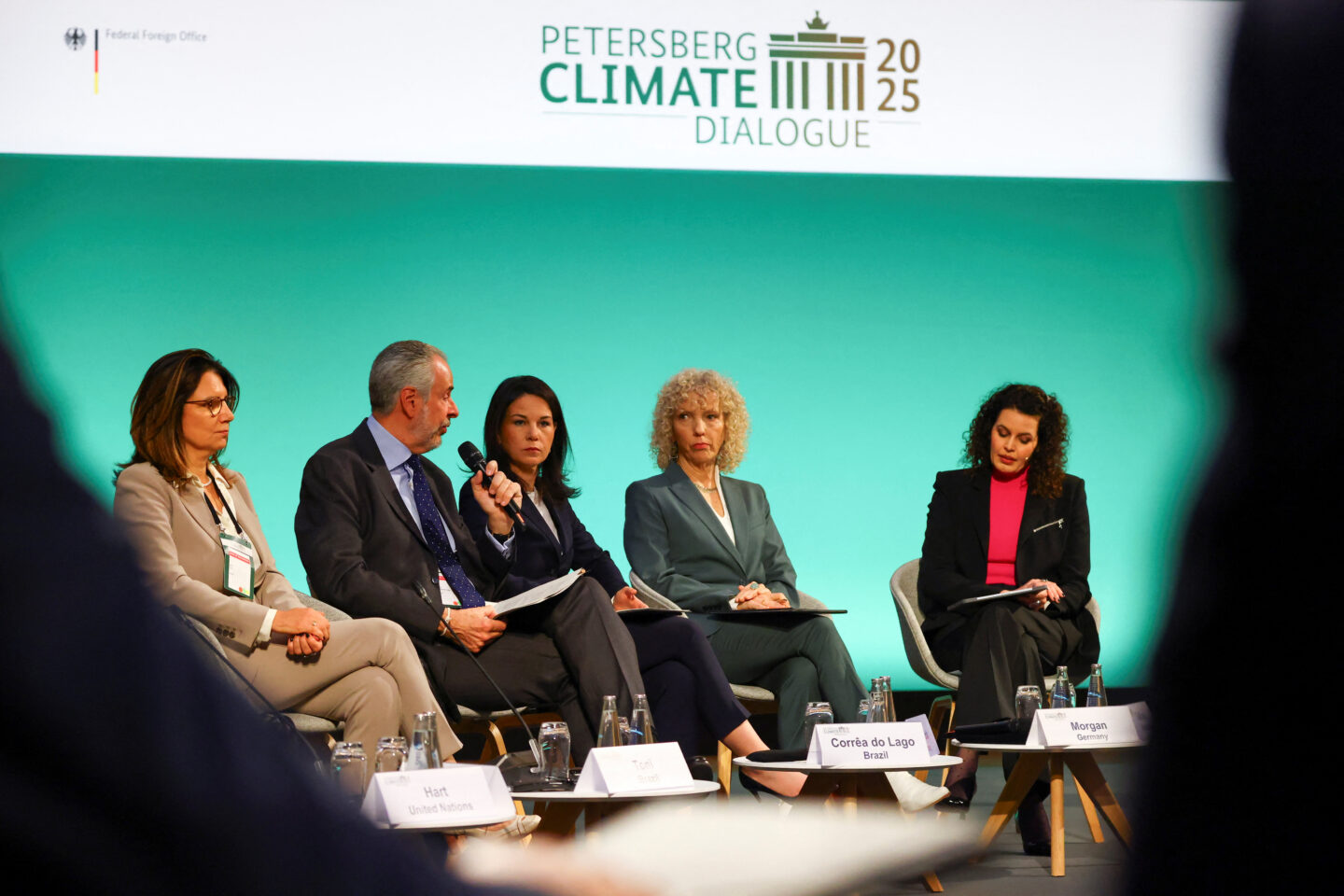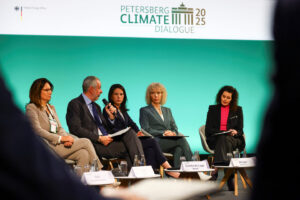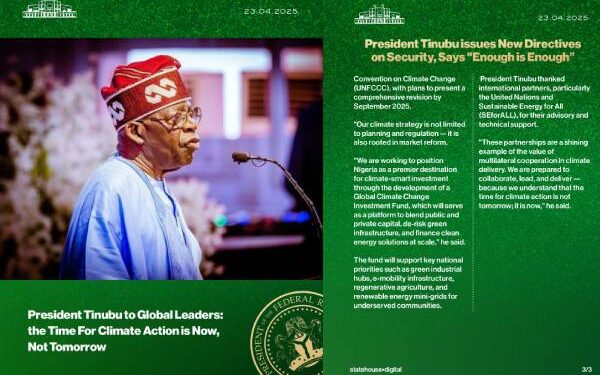
UN, Germany say tackling climate crisis is path to economic and national security
- Climate Change
- No Comment
- 88

The United Nations, Germany and Brazil joined diplomatic forces this week to convince the world of the national and economic security benefits of pursuing ambitious climate action in challenging geopolitical times on a fast-warming planet.
In a speech to the Petersberg Climate Dialogue in Berlin, UN Secretary-General António Guterres called on countries to ensure they deliver new national climate plans by September that are strong enough to limit global warming to 1.5C and to provide finance to developing countries in line with promises.
He added that climate goals would only be met “with stronger collaboration – between governments, and across society and sectors”.
“The rewards are there for the taking, for all those ready and willing to lead the world through these troubled times,” he told delegates from 40 countries by video link on Wednesday. “I urge you to seize this moment; and seize the prize.”
Electricity demand surges, expanding renewables and fossil fuels in 2024
Both Guterres and UN climate chief Simon Stiell highlighted new data from the International Renewable Energy Agency (IRENA) showing record growth of 15.1% in renewable electricity capacity – mainly solar and wind – in 2024, accounting for 92.5% of total power expansion.
“Renewables are renewing economies. They are powering growth, creating jobs, lowering energy bills, and cleaning our air. And every day, they become an even smarter investment,” said Guterres.
Nonetheless IRENA said progress is still falling short of the amount of clean electricity needed to reach a global goal to triple renewable energy capacity by 2030, which requires annual expansion of 16.6%.
Clean growth opportunities
Stiell, speaking at the “Europe 2025” conference also in Berlin, noted that renewables grew in Asia last year at double the rate in Europe – with China accounting for 64% of new global capacity – adding that “there is still so much opportunity for Europe to step up the pace”.
“In a global clean energy boom that hit $2 trillion last year, the dividends on offer are monumental,” the UN’s top climate official said. “The clean energy transition can be Europe’s economic engine-room, now – when new sources of growth are vital to buttress living standards – and for decades to come.”
On the other hand, failure to pursue a green transition and tackle the climate crisis could carve up to 2.3% off Europe’s gross domestic product (GDP) by mid-century, he warned, calling that “a recipe for permanent recession”.
Australian economist Steve Keen told Climate Home that the figure cited by Stiell – based on European Commission data – is likely an under-estimate and out of step with what climate scientists view as a global warming trajectory that could lead “to the collapse of civilisation”.
Germany’s foreign minister, Annalena Baerbock, told journalists in Berlin that “climate protection and economic growth are not contradictions”, adding Europe wants to “tap into the potential” of clean technologies.
“If others like the US decide that they want to stay outside, then it is their decision,” she said, referring to President Donald Trump’s efforts to reverse green policies and withdraw from global climate diplomacy.
“But we make it clear that we see opportunities for companies here in Europe, but also cooperation with companies and countries in Latin America and Africa and other regions of the world,” she added.

Benefits for all?
The strong messaging around the economic benefits of acting to reduce planet-heating emissions was reinforced by new analysis, commissioned by the German government and released at the Petersberg dialogue, showing that higher climate ambition makes economic sense – even in the near term.
The research, done jointly by the United Nations Development Programme and the Organisation for Economic Co-operation and Development, estimates that if countries delivered new climate plans (NDCs) that can meet the Paris Agreement goals, the world’s GDP in 2040 would be 0.2% higher than with today’s policies – equal to the current GDP of Sweden.
By 2050, it adds, strong NDCs would reduce the risk of climate-induced events, prevent significant economic losses and increase global GDP by up to 3% – and up to 13% by 2100.
UNDP head Achim Steiner told the Petersberg conference on Tuesday that while the growth percentages may look small, they translate into “billions” of dollars – and 175 million more people would be lifted out of extreme poverty with the right investments in energy transition, food security and other basic services.
The policy discussions in Germany this week represent a push at the highest international level to counter the arguments of opponents of a low-carbon transition who say the social and economic changes required will be chaotic and unaffordable, with the financial burden falling on ordinary consumers.
Brazil’s COP30 president: Climate summits must move from words to real action
Brazil’s COP30 president André Aranha Corrêa do Lago, who will chair this year’s UN climate summit in the Amazon city of Belem, said not enough effort has been made to explain the benefits of climate action to the public – and get all levels of society involved in implementing their countries’ plans.
“That’s why we want to increase as much as possible the participation of sub-national governments [at COP30] because they, at the end of the day, are the ones that are applying many of the orientations and solutions that are given in these [UN] negotiations – and the private sector, because we have to be realistic: the creation of new jobs, the adoption of new technologies, all this depends so much on the private sector,” he added.
European Commissioner for Climate Action Wopke Hoekstra praised the contribution of the Paris Agreement and the UN climate process to reining in runaway climate change, but said progress was not yet sufficient and it was important to keep going.
“I’m convinced that if we manage to succeed, and if we see more rather than less multilateralism, at COP30, we will send a very strong signal to the real economy that the transition to a net zero world is not just possible, but actually it is fully underway,” he told the same press conference.
“National security crisis”
In addition to the economic benefits, Germany’s foreign minister emphasised that tackling climate change is also “tough security policy” because “the climate crisis inflames and fuels conflicts about scarce land resources, drinking water and other resources”, threatening lives.
“The opposite is true as well,” said Baerbock. “Every centigrade of global warming that is less makes our world more secure.”
Separately, UN climate chief Stiell warned that a global failure to rein in climate change would fuel disasters making a growing number of regions unlivable and harming food production, forcing millions more people to migrate.
“Unquestionably, the climate crisis is an urgent national security crisis that should be at the top of every cabinet agenda. Surrender is not an option. And half measures are a recipe for failure,” he emphasised.
By Megan Rowling
UN, Germany say tackling climate crisis is path to economic and national security



